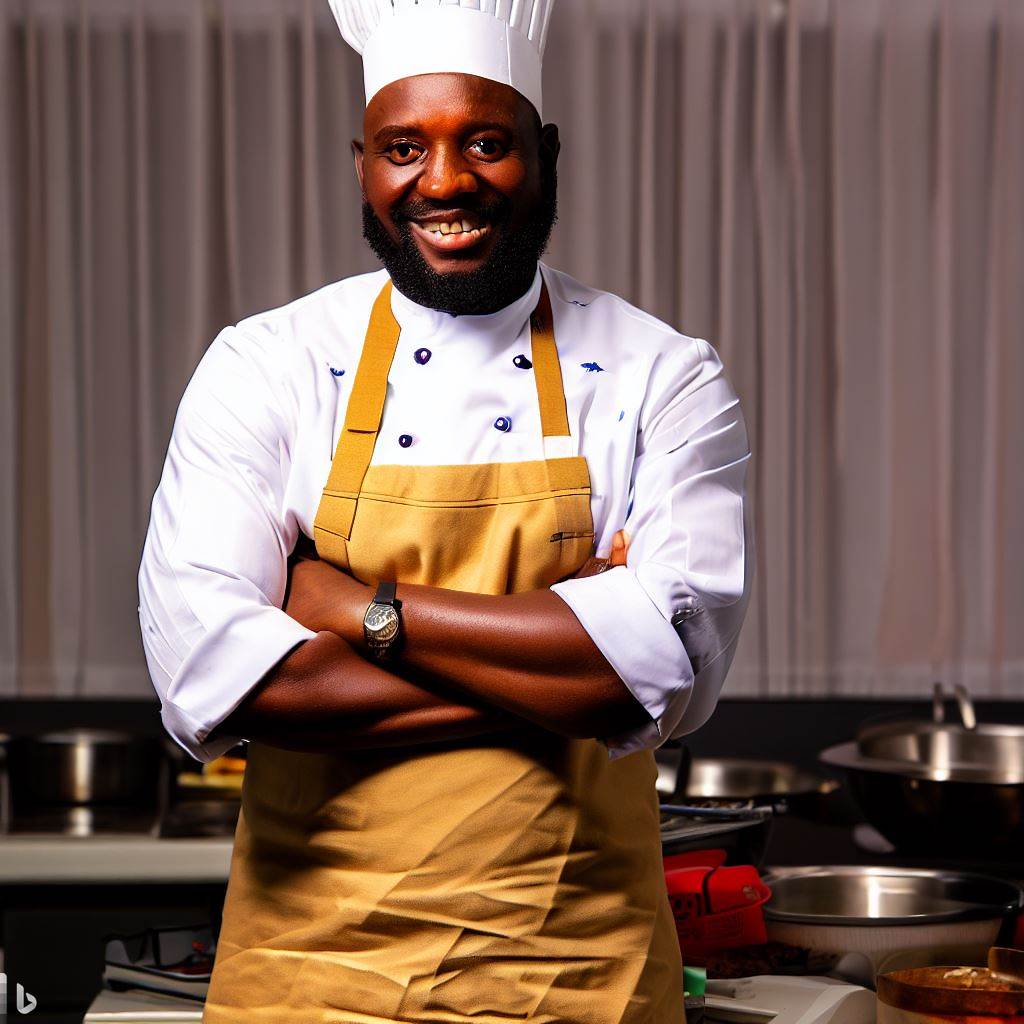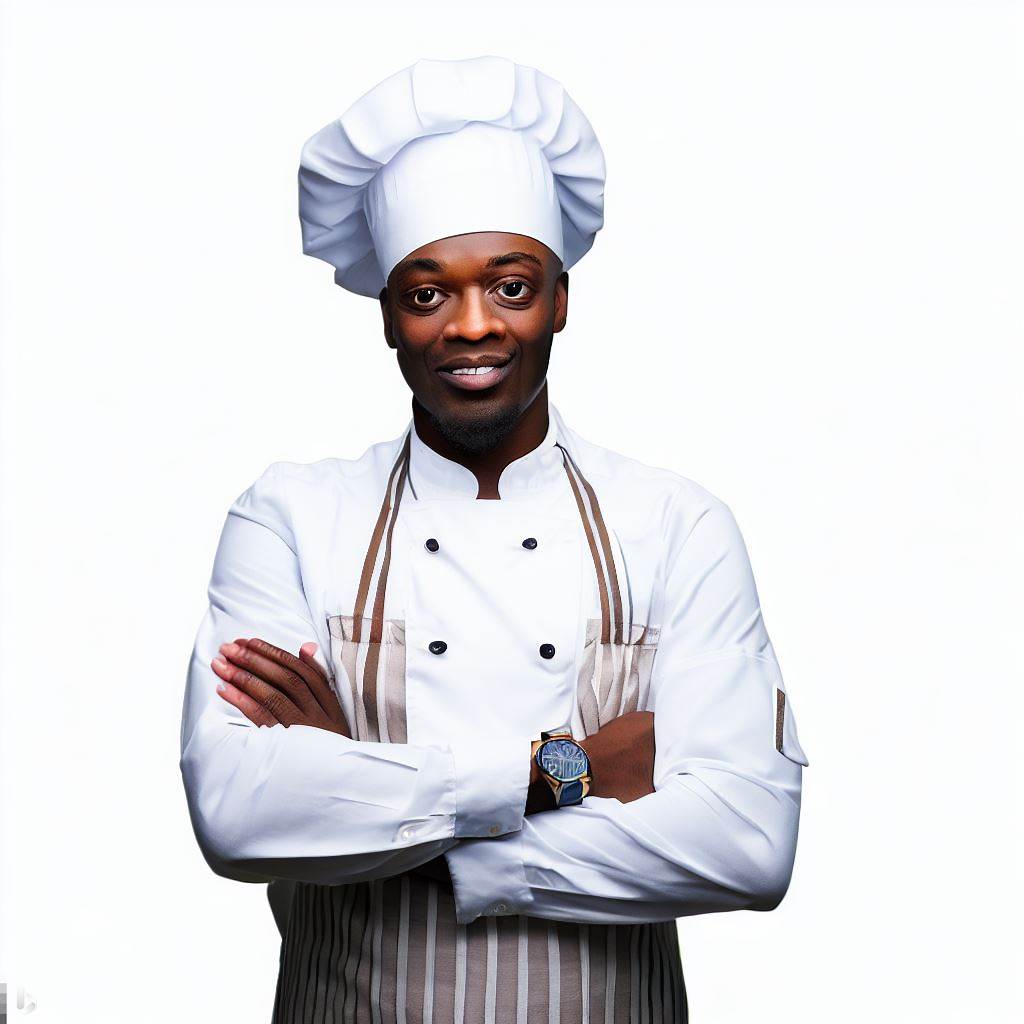Introduction
A. Nigeria’s Culinary Scene
Nigeria has a diverse and vibrant culinary scene, influenced by its rich cultural heritage and vast natural resources. This article examines Nigeria top chefs.
B. The Emergence of Top Chefs
In recent years, Nigeria has seen the rise of talented chefs who have gained recognition both locally and internationally.
Profile of Fregene Gbubemi
A. Background information (early life, education, culinary training, etc.)
Fregene Gbubemi, born and raised in Lagos, Nigeria, developed a passion for cooking at a young age.
He attended culinary school in Paris, France, where he honed his skills and learned various international cuisines.
B. Notable achievements and recognitions
Gbubemi has achieved great success in the culinary world, earning recognition both in Nigeria and internationally.
He was awarded the prestigious Chef of the Year title by the Nigerian Culinary Association for three consecutive years.
Signature dishes and cooking style earns him a spot as one of the Nigeria Top Chefs
Known for his innovative approach to Nigerian cuisine, Gbubemi creates dishes that blend traditional flavors with modern techniques.
His signature dish, “Omodero,” is a fusion of local ingredients with a French twist, showcasing his culinary expertise.
C. Influence on Nigeria’s culinary landscape
Gbubemi has made a significant impact on Nigeria’s culinary scene.
He has inspired a new generation of Nigerian chefs to experiment with local ingredients and push the boundaries of traditional dishes.
His innovative style has attracted international attention to Nigerian cuisine.
Fregene Gbubemi’s notable achievements:
- Three-time Chef of the Year winner by the Nigerian Culinary Association.
- Featured in multiple international culinary magazines for his unique approach to Nigerian cuisine.
- Invited to represent Nigeria at various international culinary conferences and events.
- Published a cookbook showcasing his signature dishes and techniques.
D. Fregene Gbubemi’s signature dishes:
- Omodero: A fusion dish combining Nigerian ingredients with French cooking techniques.
- Spicy Jollof Rice: Gbubemi’s modern twist on a traditional Nigerian staple, infused with unique spices.
- Goat Meat Pepper Soup: A flavorful and spicy soup, featuring tender goat meat and aromatic spices.
- Plantain Bruschetta: A creative twist on the classic Italian appetizer, using ripe plantains as the base.
Gbubemi’s cooking style can be described as progressive Nigerian cuisine, as he constantly pushes the boundaries of traditional flavors and techniques.
He is known for his attention to detail, presentation, and ability to create harmonious blends of flavors.
Fregene Gbubemi has emerged as one of Nigeria’s top chefs, leaving an indelible mark on the country’s culinary landscape.
Through his notable achievements, innovative dishes, and international recognition, he has inspired a new generation of Nigerian chefs and elevated Nigerian cuisine to new heights.
Read: Specialized Tour Guiding in Nigeria: Niche Opportunities
Profile of Abiola Akanji
A. Background information (early life, education, culinary training, etc.)
Abiola Akanji, born and raised in Lagos, Nigeria, discovered her passion for cooking at a young age.
She attended culinary school in Paris, where she honed her skills and learned about various international cuisines.
Akanji’s education and training provided her with a solid foundation to pursue her culinary dreams.
B. Notable achievements and recognitions
Akanji’s dedication and talent have earned her numerous accolades in the culinary industry.
She was recognized as the “Young Chef of the Year” by the Nigerian Culinary Association in 2015.
Additionally, she was awarded the prestigious Michelin Star for her exceptional culinary creations.
C. Signature dishes and cooking style
Akanji’s cooking style can be described as innovative and modern, combining traditional Nigerian flavors with a contemporary twist.
Her signature dishes often showcase the vibrant and diverse ingredients found in Nigerian cuisine.
One of her famous creations is the “Jollof Rice Risotto,” a fusion dish that combines the classic Nigerian jollof rice with Italian risotto cooking techniques.
D. Influence on Nigeria’s culinary landscape
Akanji’s culinary expertise has had a significant impact on Nigeria’s culinary landscape.
Through her unique cooking style, she has been able to introduce new flavors and techniques to traditional Nigerian dishes, captivating the palates of food enthusiasts.
Akanji has also been instrumental in promoting Nigerian cuisine internationally, participating in various culinary events and representing her country with pride.
Akanji’s influence goes beyond her culinary creations. She is actively involved in mentoring and inspiring aspiring chefs in Nigeria.
A staunch advocate for culinary education, she has set up scholarships and workshops to help young talents pursue their dreams in the culinary arts.
Akanji’s dedication to empowering the next generation of Nigerian chefs is commendable.
Lastly Abiola Akanji is a culinary force to be reckoned as on of the Nigeria Top Chefs.
Her background in culinary education, notable achievements, and unique cooking style have elevated her to the ranks of Nigeria’s top chefs.
Through her innovative dishes and influence on the culinary landscape, she has put Nigerian cuisine on the map, garnering recognition both nationally and internationally.
Akanji’s passion for cooking and dedication to promoting culinary education make her an exemplary figure in the Nigerian culinary scene.
Profile of Tunde Wey
A. Background information (early life, education, culinary training, etc.)
Tunde Wey, a Nigerian-born chef, was raised in Lagos, where he developed a keen interest in food.
After completing his secondary education, he moved to the United States to pursue higher studies.
Instead of choosing a conventional career path, Tunde decided to focus on his passion for cooking.
Tunde began his culinary journey by enrolling in a prestigious culinary school in New York City.
Under the guidance of renowned chefs, he honed his skills and acquired knowledge about different cuisines from around the world.
Tunde’s time in culinary school allowed him to experiment with different flavors, techniques, and cooking styles, shaping him into the talented chef he is today.
B. Notable achievements and recognitions
Tunde Wey has garnered widespread recognition and appreciation for his innovative approach to food and culinary activism.
His pop-up dining experiences, such as “Blackness in America,” have received critical acclaim for addressing social issues through food as the Nigeria Top Chefs
Tunde has been featured in several prominent publications, including The New York Times, for his unique dining experiences and thought-provoking food concepts.
He has also been invited as a guest chef at various international culinary events, further solidifying his reputation as a trailblazer in the culinary world.
C. Signature dishes and cooking style
Tunde Wey’s cooking style can be described as bold, unapologetic, and deeply rooted in Nigerian flavors.
He seamlessly blends traditional Nigerian ingredients with contemporary culinary techniques, resulting in dishes that are both comforting and innovative.
Some of Tunde’s signature dishes include jollof rice with a twist, where he adds unexpected ingredients to elevate the classic Nigerian rice dish.
He is also known for his flavorful stews, incorporating indigenous spices and herbs that create a symphony of taste and aroma.
D. Influence on Nigeria’s culinary landscape
Tunde Wey’s influence on Nigeria’s culinary landscape cannot be overstated.
Through his culinary activism, he has highlighted the rich cultural heritage of Nigerian cuisine and challenged the status quo. He aims to redefine perceptions about Nigerian food and the chefs behind it.
Tunde’s success has inspired a new generation of Nigerian chefs to embrace their culinary roots and experiment with innovative concepts.
His determination to use food as a medium for discussing social issues has transformed the way people approach dining experiences.
Making it more than just a means of sustenance but also a platform for dialogue and reflection.
Tunde Wey’s background, achievements, signature dishes, and influence on Nigeria’s culinary landscape make him a standout figure in the world of cuisine.
His unwavering commitment to cultural exploration through food has not only made him a respected chef but also a catalyst for change in the way people perceive Nigerian cuisine.
Read: Political Science Education: Universities in Nigeria
Profile of Muneera Tahir
A. Background Information
Muneera Tahir, born and raised in Lagos, Nigeria, developed a passion for cooking from a young age.
She attended culinary school in Paris, France, receiving formal training in French cuisine.
B. Notable Achievements and Recognitions
Tahir has gained widespread recognition for her culinary skills and makes him stay amongst the Nigeria Top Chefs
She earned the prestigious Chef of the Year title in Nigeria’s National Culinary Competition, solidifying her culinary excellence.
Furthermore, major culinary magazines have interviewed her, and she has made appearances on various television cooking shows.
C. Signature Dishes and Cooking Style
Tahir’s cooking style reflects a unique blend of her Nigerian heritage and French culinary training.
Her signature dishes include jollof rice with a gourmet twist, incorporating delicate French flavors and presentation techniques.
Her innovative use of local Nigerian ingredients in traditional French recipes further enhances her culinary reputation.
D. Influence on Nigeria’s Culinary Landscape
Tahir’s impact on Nigeria’s culinary scene cannot be overstated.
Through her TV appearances and cooking demonstrations, she has inspired a new generation of Nigerian chefs to explore the fusion of traditional Nigerian cuisine with international flavors.
Her success has also contributed to the elevation of Nigerian cuisine, gaining recognition on the global culinary stage.
Read: Customer Service Outsourcing in Nigeria: Pros & Cons

Comparison of chefs’ cooking styles and influences
A. Commonalities and differences among the featured chefs
1. Chef Adebola Adeshina:
- Specializes in traditional Nigerian cuisine with a modern twist.
- Influenced by her grandmother’s recipes and uses organic and locally sourced ingredients.
- Known for her attention to detail and presentation.
2. Tunde Wey:
- Experimental chef who combines Nigerian flavors with international techniques.
- Influenced by his travels and diverse culinary experiences.
- Known for his bold and innovative creations.
3. Michael Elegbede:
- Celebrates the richness and diversity of Nigerian ingredients.
- Influenced by his upbringing in a traditional Nigerian household.
- Known for his skillful techniques and ability to elevate simple dishes.
4. Nkesi Enyioha:
- Focuses on fusion cuisine, combining Nigerian flavors with global influences.
- Influenced by her multicultural background and love for traveling.”
- Known for her creativity and ability to create harmonious flavors.
B. How their individual styles contribute to the diversity of Nigerian cuisine
Nigeria’s top chefs bring unique perspectives and techniques to Nigerian cuisine, contributing to its diversity and evolution.
1. Adebola Adeshina:
- Her fusion of traditional and modern approaches showcases the adaptability of Nigerian cuisine.
- By using organic and locally sourced ingredients, she promotes sustainability and supports local farmers.
2. Tunde Wey:
- Through his experimental cooking, he pushes the boundaries and challenges traditional norms.
- His incorporation of international techniques introduces new flavors and expands the culinary landscape.
3. Michael Elegbede:
- By celebrating local ingredients, he highlights the richness and diversity of Nigerian cuisine.
- His skillful techniques and elevations of simple dishes add sophistication to traditional flavors.
4. Nkesi Enyioha:
- Her fusion cuisine represents the multicultural nature of Nigeria.
- By combining Nigerian flavors with global influences, she introduces exciting and unique combinations.
The diversity of these chefs’ styles contributes to the ongoing evolution of Nigerian cuisine, making it more versatile and appealing to a wider audience.
Each chef’s background and influences add layers of complexity and uniqueness to their dishes, showcasing the richness of Nigerian culinary heritage.
Overall, these chefs not only elevate Nigerian cuisine but also serve as ambassadors, promoting their culture and inspiring younger generations to embrace their culinary roots.
They captivate both locals and international food enthusiasts, showcasing endless possibilities and creativity within Nigerian cuisine.
Through their distinctive styles and influences, Nigeria’s top chefs play a vital role in shaping the future of Nigerian gastronomy in order to put a chef as one of the Nigeria Top Chefs
Read: Salaries and Benefits for Political Scientists in Nigeria
Discover More: The Role of Technology in Nigeria’s Event Planning Field
Insight into their Menus and Recipes
Examples of popular dishes from each chef
- Chef Adebola’s popular dishes include Jollof Rice with Fried Plantains and Egusi Soup.
- Chef Zainab’s reputation stems from her expertise in Suya-spiced Grilled Chicken and Moin Moin (steamed bean pudding).
- Chef Tunde’s specialties are Efo Riro (vegetable soup) and Pounded Yam with Oxtail Stew.
Unique ingredients and techniques used by the chefs
- Chef Adebola uses a secret blend of spices to enhance the flavor of her Jollof Rice. Chef Adebola, known for her modern twist on traditional Nigerian dishes, has gained popularity for her Jollof Rice with Fried Plantains.
They cook the rice to perfection and season it with a secret blend of spices, creating a flavorful, aromatic dish. - Chef Zainab incorporates ground peanuts into her Moin Moin, adding a nutty richness to the dish. Chef Zainab, on the other hand, specializes in street food-inspired dishes with a gourmet touch.
One of her highly sought-after dishes Grilled Chicken spiced with Suya, a popular Nigerian street food featuring skewered, spice-coated meat. - Chef Tunde’s Efo Riro is unique due to the inclusion of locust beans, giving it a distinct umami taste.
Chef Tunde, renowned for flavorful stews and side dishes, focuses on traditional Nigerian cuisine, showcasing his culinary expertise. His Efo Riro, a vegetable soup made with spinach and assorted meats, is a standout on his menu.
What sets Chef Tunde’s Efo Riro apart is the inclusion of locust beans, a traditional Nigerian ingredient that adds a unique umami taste to the dish.
When it comes to Nigerian cuisine, each chef brings their own flair and unique style to the table.
Let’s take a closer look at the menus and recipes of Nigeria’s top chefs to discover the mouthwatering dishes they offer.
Impact on the Nigerian Culinary Scene
A. These top chefs have elevated Nigeria’s culinary reputation through
- Creating innovative dishes that blend local ingredients and international techniques.
- Participating in international culinary competitions and gaining recognition for their skills.
- Being ambassadors of Nigerian cuisine by showcasing its diversity and rich flavors.
- Collaborating with international chefs and bringing global culinary trends to Nigeria.
- Teaching cooking classes and conducting workshops to spread knowledge and appreciation for Nigerian food.
B. Their contributions to the growth of local restaurants and tourism include
- Opening their own restaurants and showcasing unique and upscale Nigerian dining experiences.
- Training local chefs and encouraging them to explore their creativity while staying true to Nigerian traditions.
- Using locally sourced ingredients, supporting local farmers, and boosting the economy.
- Participating in food festivals, pop-up events, and food markets to promote local culinary talent.
- Promote local culinary talent by participating in food festivals, pop-up events, and food markets.
Explore Further: Nigerian Wines 101: A Sommelier’s Guide to Local Flavors
Conclusion
This section has provided an overview of Nigeria’s top chefs and their culinary creations.
A. Recap the profiles of Nigeria’s top chefs
A recap of the profiles of these chefs reveals their expertise and passion for cooking, as well as their contributions to the nation’s gastronomy.
B. The importance of their culinary contributions to the nation’s gastronomy
These chefs have not only elevated Nigerian cuisine but also put the nation on the international culinary map.
Their dedication to using locally sourced ingredients and blending traditional and modern techniques has resulted in innovative and delicious dishes.
It is important to recognize the significance of their culinary contributions in preserving and promoting Nigerian culture and heritage.
C. Encourage readers to explore the diverse flavors of Nigerian cuisine
Readers are encouraged to explore Nigerian cuisine’s diverse flavors and support these top chefs in their culinary endeavors, as well as aspiring to be the one of the Nigeria top chefs.
By indulging in their creations, not only will one experience the rich and vibrant flavors of Nigeria but also appreciate the talent and skill of these culinary maestros.
From traditional delicacies to fusion dishes, there is a wide range of options to satisfy every palate.
So, let’s embrace the culinary excellence of Nigeria’s top chefs and embark on a gastronomic adventure through the flavors of this remarkable nation.




